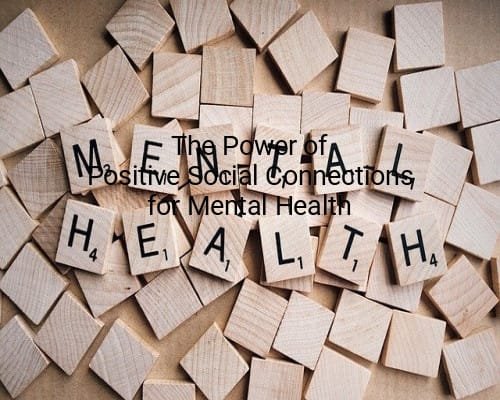The Power of Positive Social Connections for Mental Health
Introduction
Humans are inherently social beings. Our relationships with others shape our emotions, behaviors, and overall well-being. Positive social connections are crucial for mental health, playing a vital role in reducing stress, increasing happiness, and even improving physical health. In a world where loneliness and isolation are increasing, fostering strong and supportive relationships has never been more important.
This article explores the impact of positive social connections on mental health, how they contribute to emotional resilience, and practical steps to cultivate meaningful relationships.
How Social Connections Influence Mental Health
1. Reduces Stress and Anxiety
Positive relationships serve as a buffer against stress. When we share our worries with trusted friends or family, it helps reduce cortisol (the stress hormone) levels(1). A strong support network provides emotional reassurance, making challenges feel less overwhelming.
2. Enhances Emotional Resilience
Resilience is the ability to recover from setbacks and adapt to difficult situations. Social support strengthens resilience by offering comfort, encouragement, and practical solutions. Studies show that people with strong social ties tend to handle adversity better than those who feel isolated(2).
3. Improves Mood and Happiness
Engaging in social interactions triggers the release of neurotransmitters like oxytocin and dopamine, which are associated with happiness and emotional well-being(3). Even small interactions, such as smiling at a stranger or chatting with a colleague, can elevate mood.
4. Reduces Risk of Depression
Loneliness and social isolation are major risk factors for depression. A lack of social engagement can lead to negative thought patterns, low self-esteem, and a sense of purposelessness(4). Regular interactions with supportive individuals can help combat these feelings and provide a sense of belonging.
5. Encourages Healthy Behaviors
Being part of a social network often promotes healthier lifestyle choices. People with strong relationships are more likely to engage in physical activity, eat well, and avoid harmful behaviors like smoking and excessive alcohol consumption(5).
6. Strengthens Cognitive Function
Social engagement is linked to better brain health. Meaningful conversations, social activities, and emotional connections stimulate cognitive processes, reducing the risk of cognitive decline and dementia in later years(6).
The Consequences of Social Isolation
The absence of positive social connections can lead to several mental health challenges:
- Increased Stress – Without emotional support, stress can become overwhelming and lead to burnout.
- Higher Risk of Anxiety and Depression – Prolonged isolation can result in feelings of hopelessness and increased anxiety.
- Reduced Self-Worth – Social interactions affirm our sense of identity and belonging. Without them, self-esteem may decline.
- Poorer Physical Health – Research suggests that social isolation is as harmful to physical health as smoking 15 cigarettes a day(7).
Building and Maintaining Positive Social Connections
Creating meaningful relationships requires effort, but the rewards for mental health are significant. Here are practical ways to nurture positive social connections:
1. Prioritize Quality Over Quantity
It’s not about having a large social circle but about cultivating deep, meaningful relationships. A few close friends who truly understand and support you are more beneficial than numerous acquaintances.
2. Engage in Active Listening
Effective communication strengthens relationships. Listen actively, show empathy, and validate others’ emotions to build deeper connections.
3. Join Community Groups or Social Activities
Participating in group activities such as sports, volunteering, or hobby clubs provides opportunities to meet like-minded individuals and form new connections.
4. Stay Connected Despite Busy Schedules
Regular check-ins with friends and family through phone calls, video chats, or even quick messages help maintain relationships, even when life gets busy.
5. Be Open and Vulnerable
True connections form when people feel comfortable sharing their thoughts and emotions. Allow yourself to be open with trusted individuals and encourage others to do the same.
6. Limit Social Media and Focus on Face-to-Face Interactions
While social media can help maintain connections, excessive online engagement can sometimes lead to loneliness and comparison. Prioritize in-person or voice interactions whenever possible.
7. Seek Professional Support When Needed
If you struggle with social anxiety or isolation, therapy or support groups can help improve social skills and build confidence in forming relationships.
The Role of Community and Social Support Networks
Communities play a significant role in fostering positive connections. Supportive environments in workplaces, schools, and local neighborhoods encourage individuals to feel valued and included. Community programs, religious groups, and cultural organizations provide platforms for social interaction and emotional support.
Conclusion
Positive social connections are a fundamental pillar of mental well-being. They reduce stress, promote happiness, and protect against mental health disorders. In a world where loneliness is on the rise, making a conscious effort to build and maintain strong relationships is essential. Whether through friendships, family ties, or community involvement, meaningful connections create a sense of belonging and emotional security that enhances overall mental health.
By prioritizing and nurturing these relationships, we can foster a healthier, happier society.
References
- https://www.ncbi.nlm.nih.gov/pmc/articles/PMC4383411/
- https://www.apa.org/news/press/releases/stress/2017/technology-social-isolation
- https://www.frontiersin.org/articles/10.3389/fpsyg.2019.02767/full
- https://www.sciencedirect.com/science/article/abs/pii/S0165032717306967
- https://jamanetwork.com/journals/jamainternalmedicine/fullarticle/2491503
- https://www.thelancet.com/journals/lanpsy/article/PIIS2215-0366(19)30363-2/fulltext
- https://journals.plos.org/plosmedicine/article?id=10.1371/journal.pmed.1000316
SEO Tags
#MentalHealth #SocialConnections #EmotionalWellbeing #DepressionPrevention #StressReduction #HealthyRelationships #CommunitySupport #MentalWellness #LonelinessPrevention #Mindfulness
